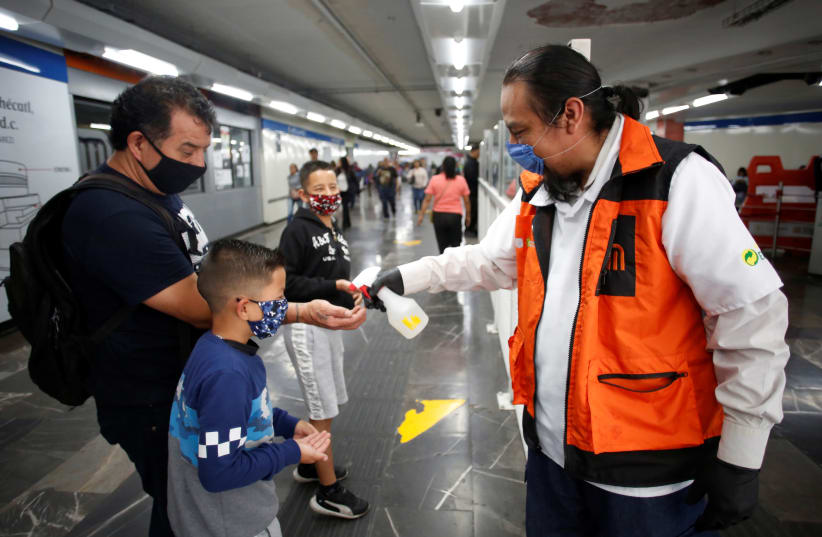"Don't you ever stay home?"
I get the same question from my mother whenever I tell her I'm traveling that weekend (which is often). She herself is by no means a shut-in, having cruised the Nile on a barge and hiked ancient footpaths in the Andes. But the sheer frequency of my travel is what unnerves her.
Some travelers are exhausted by travel, and need time in between trips to recover, while others are energized by it. Me? I'm an introvert and like my "alone" time, but when it comes to travel my appetite has few boundaries.
So in the midst of (quite legitimate) concerns about coronavirus, I took a weekend trip to Puerto Vallarta. I spent some time rationalizing: there aren't many cases in Mexico; the flights and airports aren't very full; I love fresh Pacific seafood.
Some of my assumptions panned out. The flights weren't very full, and the atmosphere felt similar to what it did in the fall and winter of 2001: everyone polite and patient in spite of their obviously frayed nerves.
After getting through the rationalization, the next question is one of self-actualization: why? Why do I keep traveling, even when it's clearly much safer and less stressful to stay home?
I wouldn't argue the "safe" bit, but less stressful? After a couple of posts about my journey, I stopped scrolling through Facebook to find endless jokes about toilet paper and admonishments to supply-hoarders. There are opportunities for stress wherever you are – even when you're sipping Pacifico in the sand – and I wasn't about to let them creep in.
Sometimes I feel like my urge to keep traveling has a documentary quality. There's something romantic about the correspondents who rushed into the fires to chronicle them, like Ernest Hemingway commandeering a military Jeep to be the first American civilian into Paris in 1944 to "liberate" the bar at the Ritz Hotel. In Mexico, among tourists from the north, it's as though everyone is taking pains not to discuss the elephant in the room, and that's the snapshot I'm after.
For me, the desire to see the world isn't one of postcard idealism. I want to see what the world looks like when it's not perfect, too. There was a strange beauty in how we traveled just after 9/11. The additional security checks were frustrating, but travelers saw their value. The uncertainty among travel industry workers about their futures put their more authentic humanity on full display; travelers saw that and responded with understanding.
It's also interesting how humans have the capacity to think of whatever hurdles stand up during their present as extraordinary. Suddenly COVID-19 facemasks are different from SARS facemasks. Post-9/11 security checks were different from Gulf War security checks. A generation from now, travelers of this period will bear witness when the next generation looks upon their struggle as unprecedented.
The word "quarantine" itself dates back to the middle ages when the city-state of Ragusa (modern-day Dubrovnik) imposed a 40-day (Italian: quaranta giorni = 40 days) waiting period on arriving ships to ensure their occupants didn't carry the plague. What strikes me is that even during the Black Death, which wiped out roughly a third of Europe's population, there were still ships arriving to quarantine.
Even in those days, when there was little relief for an ailment of any kind (contemporary prescriptions overwhelmingly did more harm than good) and everything from a sore leg to a sniffle was potentially fatal, there was still a basic understanding that isolation could put a stop to a pandemic. Even then, they traveled on.
Every generation has its intrepid travelers, and as with most adventures, everyone has their endurance limits. Several of my friends were also traveling at the same time. One returned early from Europe, awakening to news of new travel restrictions to the US. One had an abbreviated trip to New Zealand after the country announced entry restrictions and airlines began to cancel flights.
I myself am also about ready to pack it in for a while. The calculus has shifted. Concerns of catching and subsequently transmitting the virus have morphed into acceptance of the eventuality that free movement will be curtailed as borders close in efforts to contain the threat.
I've seen the warts-and-all realities I was curious about, and it's time to retire to the couch (yes, Mom, I do stay home sometimes) with a stack of treasured books and films about travel. Instead of the rush I get at the ink of a customs stamp hitting my passport I'll be transfixed as Bergman is coaxed onto the silver Air France propliner in Casablanca, or Streep, anxious that her crystal and china aren't broken on the train across Kenya.
And when the next crisis hits, I'll probably travel right up until the gates swing shut then, too. (TravelPulse/TNS)
TravelPulse is a leading travel authority on the web, providing consumer travel news and insider tips and advice for an ever-changing travel world. Read more stories at travelpulse.com
